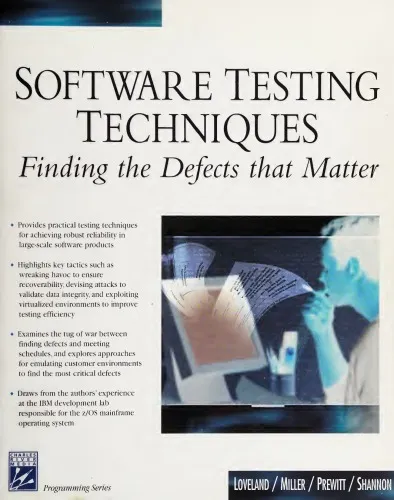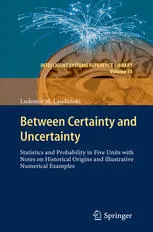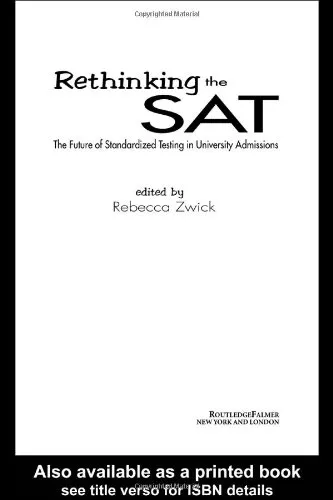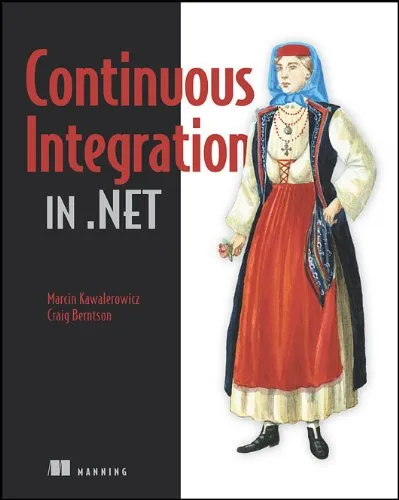Measuring Success: Testing, Grades, and the Future of College Admissions
4.0
Reviews from our users

You Can Ask your questions from this book's AI after Login
Each download or ask from book AI costs 2 points. To earn more free points, please visit the Points Guide Page and complete some valuable actions.Related Refrences:
Introduction to "Measuring Success: Testing, Grades, and the Future of College Admissions"
"Measuring Success: Testing, Grades, and the Future of College Admissions," edited by Jack Buckley, Lynn Letukas, and Ben Wildavsky, is an insightful and thought-provoking exploration of the complex world of college admissions. This book examines the intricate balance between standardized testing, high school grades, and the broader criteria used in selecting students for higher education in the United States. With contributions from educators, policymakers, and researchers, it offers a diverse range of perspectives on the pressing issues of equity, access, and fairness in college admissions.
In an era of growing skepticism about the utility and fairness of standardized testing, "Measuring Success" is an essential resource for anyone seeking to understand how current admissions practices work and how they might evolve. The editors bring together a rich collection of essays that address the historical context of admissions, the role of testing and grades, the implications of alternative policies, and the broader societal impact of these frameworks. It does not shy away from tough questions: Are standardized tests inherently biased? Do grades offer a more comprehensive picture of a student's potential? And how should colleges balance merit, diversity, and socio-economic equity?
This book aims to foster meaningful conversations about the future of college admissions while weighing the trade-offs and implications of various approaches. It is relevant not only to academic professionals but also to students, parents, and policymakers who wish to understand the dynamics of college admissions in a rapidly changing world.
Detailed Summary of the Book
At its core, "Measuring Success" is a detailed examination of the intersection of standardized testing and high school achievement within the context of college admissions. It addresses key questions such as how testing fits into a holistic admissions process and how well tests predict long-term academic success. The book takes readers through the history of testing, analyzing its evolution and the controversies surrounding it, including its accessibility, fairness, and societal implications.
The contributors explore various alternative models to standardized testing, such as test-optional policies, and provide evidence on the impact of such policies on diversity and equity in admissions. Essays also delve into the role of grades, asking whether they serve as a more reliable indicator of student potential or whether they are susceptible to systemic biases such as grade inflation. Together, the chapters paint a nuanced picture of a complex system where every approach has its strengths and trade-offs.
Crucially, "Measuring Success" takes a forward-looking approach to spark discussions about the long-term future of admissions. It invites readers to consider not just the data but also the broader mission of higher education in building equitable, diverse, and academically excellent institutions.
Key Takeaways
- Standardized tests like the SAT and ACT provide a common metric but have faced growing criticism regarding equity and fairness.
- High school grades are important but may also reflect disparities linked to socio-economic status, school quality, and other external factors.
- Emerging approaches like test-optional admissions policies aim to level the playing field, but their overall impact on access and long-term outcomes remains a topic of debate.
- The book underscores the need for a balanced, evidence-based approach to admissions, combining multiple metrics to assess student potential effectively.
- Reforms in college admissions must evaluate not just academic merit but also address societal concerns about diversity, opportunity, and fairness.
Famous Quotes from the Book
"Testing is not about perfection but about creating opportunities for students to demonstrate their capabilities and aspirations."
"Grades tell a story, but without context, they are an incomplete narrative of a student's true potential."
"Holistic admissions are not a panacea, but they represent an effort to align educational values with the realities of a diverse society."
Why This Book Matters
In a time when the value and fairness of standardized tests are under scrutiny, "Measuring Success" provides a vital contribution to the debate. It goes beyond the rhetoric to present evidence-based perspectives and pragmatic solutions. Whether you are a student hoping to understand admissions better, a policymaker shaping educational reforms, or an academic seeking comprehensive research on the topic, this book offers profound insights into the intricacies of an evolving system.
What sets this book apart is its balanced approach, combining the voices of experts from multiple disciplines to challenge assumptions while exploring feasible pathways to improvement. By framing college admissions within larger societal and educational goals, "Measuring Success" pushes readers to think critically about how to create a fairer and more inclusive system. It is not merely a book about testing and grades; it is a call to action for building a future where every student has a chance to succeed.
Free Direct Download
You Can Download this book after Login
Accessing books through legal platforms and public libraries not only supports the rights of authors and publishers but also contributes to the sustainability of reading culture. Before downloading, please take a moment to consider these options.
Find this book on other platforms:
WorldCat helps you find books in libraries worldwide.
See ratings, reviews, and discussions on Goodreads.
Find and buy rare or used books on AbeBooks.
1339
بازدید4.0
امتیاز0
نظر98%
رضایتReviews:
4.0
Based on 0 users review
Questions & Answers
Ask questions about this book or help others by answering
No questions yet. Be the first to ask!
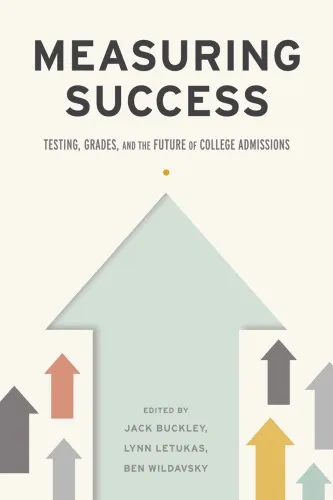




![Gray's Anatomy for Students [with Student Consult Online Access]](https://s3.refhub.ir/images/thumb/Gray_s_Anatomy_for_Students__with_Student_Con_2728_GXWaXqO.webp)


